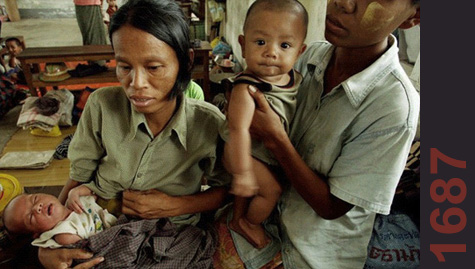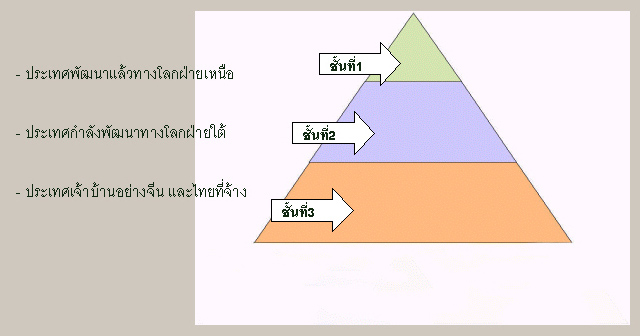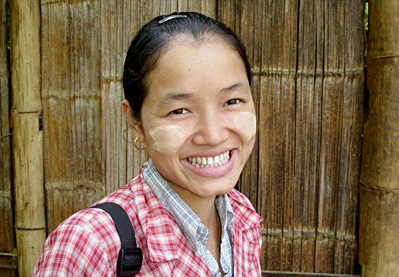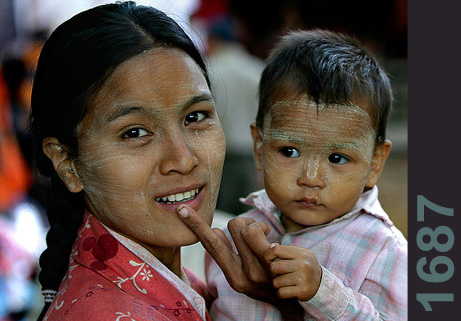


1
2
3
4
5
6
7
8
9
10
11
12
13
14
15
16
17
18
19
20
21
22
23
24
25
26
27
28
29
30
31
32
33
34
35
36
37
38
39
40
41
42
43
44
45
46
47
48
49
50
51
52
53
54
55
56
57
58
59
60
61
62
63
64
65
66
67
68
69
70
71
72
73
74
75
76
77
78
79
80
81
82
83
84
85
86
87
88
89
90



Caught Between Two Hells
- by Burmese Women's Union
ติดอยู่ระหว่างสองขุมนรก:
ว่าด้วยแรงงานพม่าย้ายถิ่นหญิงและเด็กหญิง
อัจฉรียา
สายศิลป์ : เรียบเรียง
นักวิชาการอิสระ สนใจประเด็นเกี่ยวกับปัญหาสิทธิมนุษยชนและสื่อพลัดถิ่นพม่า
บทความวิชาการนี้
สามารถ download ได้ในรูป word
หมายเหตุ: บทความชิ้นนี้
มหาวิทยาลัยเที่ยงคืนได้รับมาจากผู้เรียบเรียง
เป็นเรื่องเกี่ยวกับแรงงานหญิงพม่าพลัดถิ่นในประเทศปลายทาง ซึ่งได้รับการปฏิบัติ
โดยละเลยต่อประเด็นสิทธิมนุษยชนสากล และเป็นไปในทางเลวร้าย ตั้งแต่การถูกดุด่า
ว่ากล่าว ตบตี และกระทั่งถูกคุกคามทางเพศโดยปราศจากการคุ้มครองทางกฎหมาย
บทความสิทธิแรงงานหญิงพม่าพลัดถิ่น
ประกอบด้วยหัวข้อสำคัญดังต่อไปนี้
- บทนำ: วัฒนธรรมการย้ายถิ่นของพม่า
- สาเหตุของการเกิดแรงงานย้ายถิ่นพม่า
- ความแตกต่างระหว่างผู้ลี้ภัยและผู้ย้ายถิ่น
- ระบบการย้ายถิ่นสามชั้น (Three-Tier System)
- งานของแรงงานย้ายถิ่นจากพม่า
- การย้ายถิ่นของผู้ชาย มีมากกว่าผู้หญิง
- ชีวิตในชั้นล่างสุด: แรงงานย้ายถิ่นหญิงและเด็กหญิงในชั้นที่สาม
ติดต่อมหาวิทยาลัยเที่ยงคืน : midnightuniv(at)gmail.com
บทความเพื่อประโยชน์ทางการศึกษา
ข้อความที่ปรากฏบนเว็บเพจนี้ ได้รักษาเนื้อความตามต้นฉบับเดิมมากที่สุด
เพื่อนำเสนอเนื้อหาตามที่ผู้เขียนต้องการสื่อ กองบรรณาธิการเพียงตรวจสอบตัวสะกด
และปรับปรุงบางส่วนเพื่อความเหมาะสมสำหรับการเผยแพร่ รวมทั้งได้เว้นวรรค
ย่อหน้าใหม่ และจัดทำหัวข้อเพิ่มเติมสำหรับการค้นคว้าทางวิชาการ
บทความทุกชิ้นที่เผยแพร่บนเว็บไซต์แห่งนี้ ยินดีสละลิขสิทธิ์เพื่อมอบเป็นสมบัติ
ทางวิชาการแก่สังคมไทยและผู้ใช้ภาษาไทยทั่วโลก ภายใต้เงื่อนไข้ลิขซ้าย (copyleft)
บทความมหาวิทยาลัยเที่ยงคืน
ลำดับที่ ๑๖๘๗
เผยแพร่บนเว็บไซต์นี้ครั้งแรกเมื่อวันที่
๒๐ กุมภาพันธ์ ๒๕๕๒
(บทความทั้งหมดยาวประมาณ
๑๗.๕ หน้ากระดาษ A4)
++++++++++++++++++++++++++++++++++++++++++++++++++++++++++++++++++++

Caught Between Two Hells
- by Burmese Women's Union
ติดอยู่ระหว่างสองขุมนรก:
ว่าด้วยแรงงานพม่าย้ายถิ่นหญิงและเด็กหญิง
อัจฉรียา
สายศิลป์ : เรียบเรียง
นักวิชาการอิสระ สนใจประเด็นเกี่ยวกับปัญหาสิทธิมนุษยชนและสื่อพลัดถิ่นพม่า
บทความวิชาการนี้
สามารถ download ได้ในรูป word
รายงานสถานการณ์ของแรงงานย้ายถิ่นหญิงในประเทศไทยและประเทศจีน
จัดทำโดย Burmese Women's Union
เกี่ยวกับ BWU
สหภาพสตรีพม่าก่อตั้งขึ้นเมื่อ วันที่ 7 มกราคม ค.ศ. 1995 โดยกลุ่มนักเคลื่อนไหวเยาวสตรี
ที่ออกจากประเทศพม่ามายังชายแดนไทย-พม่า ในระหว่างการปราบปรามผู้ประท้วงโดยรัฐบาลเผด็จการทหารพม่าเมื่อปี
ค.ศ. 1988 โดยมีเป้าหมายเพื่อส่งเสริมบทบาทของผู้หญิงในการมีส่วนร่วมทางการเมือง
สนับสนุนสิทธิสตรีและความเท่าเทียมทางเพศ เสริมสร้างความสามารถและพลังของผู้หญิง
(เกี่ยวกับสหภาพสตรีพม่า และสตรีพม่า ดูเพิ่มเติมในภาคผนวกท้ายบทความ
- ภาษาอังกฤษ)
บทสรุปสำหรับผู้บริหาร (Executive Summary)
นักวิจัยของ BWU จำนวน 10 คน ได้ทำการสัมภาษณ์เชิงลึกกลุ่มแรงงานย้ายถิ่นหญิงและเด็กหญิง จำนวน 149 คน ในจังหวัดเชียงใหม่, อำเภอแม่สอด จังหวัดตาก, จังหวัดระนองของประเทศไทย และในเมือง Rulli ของประเทศจีน ระหว่างเดือนพฤศจิกายน ค.ศ. 2006 - มีนาคม ค.ศ.2007 ผู้หญิงเหล่านี้มีอายุในวัยต่างๆ เป็นกลุ่มชาติพันธุ์ที่แตกต่าง และทำงานในหลายสาขา ดังนั้นรายงานนี้จึงเป็นการบอกเล่าประสบการณ์ชีวิตของผู้หญิงที่หลากหลาย โดยเน้นให้เห็นถึงสภาพการทำงานที่เลวร้ายในแต่ละวัน และการละเมิดสิทธิมนุษยชนที่เกิดขึ้นกับแรงงานหญิงและเด็กหญิง ซึ่งทำงานในสภาวะที่ไม่ปกติและแสดงให้เห็นถึงอันตรายจากการทำงานที่เกิดขึ้นกับแรงงานจากประเทศพม่า ที่ทำงานในประเทศไทยและจีน. การสัมภาษณ์ได้ถูกออกแบบเพื่อเปิดโอกาสให้แรงงานเหล่านี้ได้เปล่ง'เสียง' เพื่อพูดสิ่งที่อยู่ในใจและได้แสดงความคิดเห็นเกี่ยวกับเรื่องงาน ซึ่งเป็นสิ่งที่มักจะถูกปฏิเสธในประเทศที่พวกเขาทำงานอยู่
จากการวิจัยพบว่า
- แรงงานย้ายถิ่นหญิงและเด็กหญิงจากพม่า มีโอกาสในการทำงานจำกัดมากในประเทศเจ้าบ้าน (Host Countries) เนื่องจากสถานภาพที่ไม่ปกติ และมักจะถูกผลักไสให้ไปทำงานที่ที่เรียกว่า 3Ds คือ สกปรก (Dirty) อันตราย (Dangerous) และต่ำต้อย (Demeaning) และได้รับสิทธิของแรงงานเพียงเล็กน้อยหรือไม่มีเลย- แรงงานย้ายถิ่นหญิงและเด็กหญิง มักจะถูกทำให้เป็นชายขอบ(*) หรือยิ่งกว่าชายขอบ และเสี่ยงต่อการถูกละเมิดสิทธิมนุษยชน เนื่องมาจากทั้งการขาดสถานะทางกฎหมาย และจากสาเหตุเพศสภาวะ (Gender) (**) ของพวกเธอ
- ความปลอดภัยของแรงงานย้ายถิ่นหญิงและเด็กหญิงนั้น อยู่ในขั้นอันตราย เห็นได้จากการที่พวกเธอต่างมีประสบการณ์ในการถูกกระทำและละเมิดทางเพศ รวมทั้งความรุนแรงเมื่อทำงานในประเทศเจ้าบ้าน
(*) ชายขอบ (Marginal) ซึ่งอยู่ในตอนปลายหรือขอบของเขตหรือบริเวณที่รับรู้กันอยู่ เช่น เขตดินแดนท้องที่ หรือ เขตวัฒนธรรม คำนี้มีความหมายแฝงอยู่ กล่าวคือ ผู้คนหรือสิ่งที่อยู่ในบริเวณชายขอบนั้นมีการแยกตัวจากส่วนใหญ่ ไม่ปรับตัวให้เข้ากับส่วนใหญ่ หรือมีลักษณะที่ผิดแผกไปจากปรกติของส่วนใหญ่ (พจนานุกรมสังคมวิทยา, 2524)
(**) เพศภาวะ (Gender) ลักษณะต่างๆ ของผู้ชายและผู้หญิงที่สร้างขึ้นโดยกระบวนการทางสังคม สามารถเปลี่ยนแปลงได้ตามกาลเวลา และมีความหลากหลายทั้งภายในวัฒนธรรมเดียวกัน และต่างวัฒนธรรม
BWU ขอเรียกร้องให้ SPDC (*) และรัฐบาลของประเทศเจ้าบ้านให้คำนึงถึงสิทธิมนุษยชนขั้นพื้นฐาน และความต้องการของแรงงานย้ายถิ่น. BWU ยืนยันว่ากฎหมายสิทธิมนุษยชนระหว่างประเทศควรถูกนำมาใช้เพื่อปกป้องแรงงานย้ายถิ่นที่ทำงานในสถานภาพที่ไม่ปกติ โดยคุ้มครองสิทธิแรงงานและสิทธิมนุษยชนของพวกเขา และโดยการเปิดช่องทางให้มีการร้องเรียนเมื่อพวกเขาถูกละเมิด
(*)The State Peace and Development (abbreviated SPDC or Na Ah Hpa in Burmese) is the official name of the military regime of Burma (also known as Myanmar), which seized power in 1988. The SDPC was originally known as State Law and Order Restoration Council (SLORC). It replaced the role of Burma Socialist Programme Party (BSPP) and was a mainly cosmetic change. In 1997, SLORC was abolished and reconstituted as the State Peace and Development Council (SPDC).
The SPDC consists of the commanders of the service branches and of the regional military commands. The eleven members of the junta[2] probably wield a great deal more power than the cabinet ministers. Some members of the junta also hold cabinet portfolios. By most accounts, regional commanders enjoy a great deal of autonomy in their respective areas.
บทนำ: วัฒนธรรมการย้ายถิ่นของพม่า
รายงานนี้ได้รับแรงบันดาลใจมาจากการที่ BWU ได้ขยายการให้ความช่วยเหลือแรงงานหญิงและเด็กหญิงจากพม่า(*) ในจังหวัดเชียงใหม่, อำเภอแม่สอด จังหวัดตาก, จังหวัดระนองของประเทศไทย เมือง Mizorum ของประเทศอินเดีย และในเมือง Rulli ของประเทศจีน ซึ่งทำให้สมาชิกของ BWU ได้มีโอกาสพูดคุยกับผู้หญิง เด็กหญิง ผู้ชายในชุมชนผู้ย้ายถิ่นเกี่ยวกับชีวิตของพวกเขาแรงงานหญิงและเด็กหญิง ซึ่งได้แสดงออกถึงความคับข้องใจที่พวกเธอไม่มีสิทธิ ไม่มีเสียงในการทำงานในประเทศเจ้าบ้าน และการไร้พลังอำนาจอันเนื่องมาจากการเป็นแรงงานย้ายถิ่นในสถานะที่ไม่ปกติ (**) หลายคนต้องการที่จะแบ่งปันเรื่องราวของพวกเธอ ประสบการณ์ในการอยู่ในขุมนรกที่พม่า และการมาอยู่ในขุมนรกอีกแห่งหนึ่งนอกประเทศพม่า
(*) ในภาษาอังกฤษ BWU ใช้คำว่า Burma แทน Myanmar เนื่องจากถูกเปลี่ยนโดยรัฐบาลทหารพม่าหลังการรัฐประหารในปี 1989 เพื่อที่จะพยายามแสดงว่าไม่เกี่ยวข้องกับความรุนแรง การละเมิดสิทธิมนุษยชนในพม่า การใช้คำว่า Burma แทนนี้ มักจะใช้ในกลุ่มองค์กรส่งเสริมประชาธิปไตย รวมทั้ง BWU ด้วย เพื่อเป็นการแสดงการต่อต้านการปกครองโดยรัฐบาลทหาร
(**) องค์การแรงงานระหว่างประเทศ (ILO) กำหนดว่าผู้ที่เข้าไป หรือทำงานในประเทศโดยไม่ได้รับการรับรองตามกฎหมายก็ถือว่าผิดกฎหมาย... ผู้ย้ายถิ่นโดยผิดกฎหมายก็มีนัยยะแสดงถึงแนวคิดบรรทัดฐาน ในเชิงเรื่องการผิดกฎหมาย (ที่มา: Amnesty International, Living in the Shadow, Amnesty International Publications (2006), p. 7.) สำหรับ ในรายงานนี้จะใช้คำว่า "ผู้ย้ายถิ่นในสถานะไม่ปกติ"แทนคำว่า"ผู้ย้ายถิ่นผิดกฎหมาย"
สาเหตุของการเกิดแรงงานย้ายถิ่นพม่า
แรงงานย้ายถิ่นที่อาศัยอยู่นอกประเทศบ้านเกิดพบได้ทั่วโลก องค์การแรงงานระหว่างประเทศ (ILO) ประมาณการไว้ว่ามีแรงงานย้ายถิ่น 9 ล้านคนที่ทำงานอยู่นอกประเทศที่เกิด (ที่มา: International Labour Organization (ILO), Facts on Migrant Labour (2004).) สาเหตุของการย้ายถิ่นนั้นขึ้นอยู่กับสภาพแวดล้อมของแต่ละคน แต่แรงงานย้ายถิ่นจากพม่านั้น การย้ายถิ่นถือเป็นทางเลือกเดียวเพื่อความอยู่รอด พวกเขาออกจากพม่ามาเพื่อหนีจากความยากจนข้นแค้น การละเมิดสิทธิมนุษยชน การกดขี่ข่มเหง และความขัดแย้งโดยการใช้อาวุธ ที่ต่อเนื่องมายาวนานจากรัฐบาลทหารพม่า ซึ่งเป็นที่รู้จักในนาม สภาเพื่อสันติภาพและการพัฒนาแห่งรัฐ (State Peace and Development Council: SPDC)
กว่าสี่ทศวรรษภายใต้การปกครองโดยทหารและการบริหารทางเศรษฐกิจที่ผิดพลาดของรัฐบาล ได้ทำให้พม่าที่เคยเป็นประเทศร่ำรวยทรัพยากรธรรมชาติ กลายเป็นประเทศที่ยากจนที่สุดประเทศหนึ่งในโลก The Economist ประมาณการว่า ร้อยละ 75 ของประชากรพม่า มีฐานะอยู่ต่ำกว่าเส้นความยากจน (Poverty Line) และประเทศพม่า มีผลิตภัณฑ์มวลรวมภายในประเทศต่อคนต่ำที่สุดในภูมิภาค ซึ่งต่ำกว่าบังกลาเทศ ลาว ไทย มาเลเซีย และเวียดนาม (The Economist, Country Profile 2004: Myanmar (Burma), 2004)
วิกฤตด้านเศรษฐกิจประกอบกับการที่พม่าขาดแคลนโครงสร้างพื้นฐาน การสาธารณสุขและการศึกษา(*) รวมทั้งการตกอยู่ภายใต้การปกครองอย่างกดขี่ของทหารหลายทศวรรษ การข่มเหงชนกลุ่มน้อย สงครามกลางเมืองที่ยังดำเนินอยู่ การบังคับย้ายถิ่นฐานและบังคับใช้แรงงาน เป็นสาเหตุให้อนาคตของชาวพม่าไม่มั่นคงและดูสิ้นหวัง สำหรับหลายคนการอยู่รอดในพม่าดูจะเป็นไปไม่ได้อีกต่อไป พวกเขาจึงต้องเสี่ยงออกมาอยู่ในประเทศอื่น เพื่อแสวงหาชีวิตที่ดีกว่าเพื่อตนเองและครอบครัว
(*) พม่าอยู่ในอันดับที่ 190 จาก 191 ประเทศในด้านของการดูแลด้านสาธารณสุขที่ย่ำแย่ ซึ่งรัฐบาลพม่าใช้งบประมาณเพียงร้อยละ 3 กับเรื่องสาธารณสุข และร้อยละ 8 กับด้านการศึกษา ขณะที่งบประมาณด้านการทหารสูงถึงร้อยละ 30 -50 (ที่มา: Social Watch, Extended Data of Myanmar-Burma, available at www.socwatch.org.uy/en/fichasPais/ampliado_137.html)
ในรายงานของ BWU เมื่อ ค.ศ. 2000 ชื่อว่า Cycle of Suffering (วงจรแห่งความทุกข์ทรมาน) ได้อธิบายถึงเงื่อนไขภายในพม่าที่เป็นปัจจัยผลักดันการย้ายถิ่นของประชากร นอกจากนั้นยังมีปัจจัยภายนอกอย่างการเติบโตทางเศรษฐกิจในประเทศเพื่อนบ้าน และอัตราแลกเปลี่ยนเงินตราที่สูงเป็นปัจจัยดึงดูดในการย้ายถิ่นของแรงงานย้ายถิ่น (**) ในขณะที่สถานการณ์ในพม่านั้นเลวร้ายลงทุกปี แต่ปัจจัยดึงดูดกระแสการย้ายถิ่นของชาวพม่านั้นยังคงอยู่ ซ้ำยังมีอิทธิพลเข้มข้นขึ้นทุกวัน ที่ทำให้ชาวพม่าตัดสินใจย้ายถิ่นฐาน
(**) จากข้อมูลของ Refugees International ประเทศพม่ามีประชากรย้ายถิ่นที่มากที่สุดในเอเชียตะวันออกเฉียงใต้ www.refugeesinternational.org
ปรากฏการณ์การย้ายถิ่นของผู้คนจำนวนมากนั้นสัมพันธ์กับวัฒนธรรมการย้ายถิ่นของชาวพม่า เนื่องจากการย้ายถิ่นของชาวพม่า ไม่ว่าจะเป็นภายในประเทศหรือข้ามชายแดนไปยังประเทศอื่นๆ ได้กลายเป็นวิถีและวัฒนธรรมสำหรับแทบจะทุกผู้ทุกคนในพม่า และเป็นสิ่งที่เกิดขึ้นในทุกภาคของประเทศ นอกจากนั้น การย้ายถิ่นได้เปลี่ยนแปลงจากการเป็นกระบวนการในทางเศรษฐกิจกลายเป็นความพยายามอยู่รอดจากการต้องต่อสู้กับความยากจน และการละเมิดสิทธิมนุษยชน
ความแตกต่างระหว่างผู้ลี้ภัยและผู้ย้ายถิ่น
แม้ว่าผู้ลี้ภัย(Refugees) และผู้ย้ายถิ่น (Migrants) ดูแทบจะไม่แตกต่างกันเลยเนื่องจากความต้องการออกจากพม่าด้วยเหตุผลเดียวกันคือ เพื่อให้รอดพ้นจากการกดขี่ของรัฐบาลทหาร แต่ในประชาคมนานาชาติ ได้กำหนดความแตกต่างระหว่างผู้ลี้ภัยและผู้ย้ายถิ่นไว้ ดังนี้
ภายใต้กฎหมายระหว่างประเทศ "ผู้ลี้ภัย" คือบุคคลที่อยู่นอกประเทศที่พวกเขาเป็นพลเมืองหรือพำนักอาศัยอยู่ มีความกลัวว่าจะถูกข่มเหงเนื่องจากเชื้อชาติ ศาสนา สัญชาติ การเป็นสมาชิกของกลุ่มสังคมหรือการเมือง และพวกเขาไม่สามารถหรือไม่ยินดีที่จะอยู่ภายใต้การปกป้อง (ปกครอง) ของประเทศนั้น หรือเดินทางกลับไป เนื่องจากหวาดกลัวการถูกข่มเหง (ที่มา: The 1951 Convention Relating to the Status of Refugees , www.unchr.ch)
อย่างไรก็ตามในประเทศไทย รัฐบาลไทยยอมรับผู้ลี้ภัยในฐานะ ผู้หนีภัยจากการสู้รบซึ่งผู้ที่ได้รับการยอมรับจะอยู่ในค่ายผู้ลี้ภัยที่รับรองโดย United Nations High Commissioner for Refugees (UNHCR) ซึ่งบุคคลกลุ่มนี้จะอยู่ในค่ายที่พักพิงตามแนวชายแดนพม่า แต่ยังมีประชากรจำนวนมากที่เป็นแรงงานย้ายถิ่นไม่ได้มีสถานะหรือการคุ้มครองเช่นนั้น. Refugees International ประมาณไว้ในปี ค.ศ. 2006 ว่า มีผู้ลี้ภัยจากพม่าราว 250,000 คนอยู่ในประเทศเพื่อนบ้านพม่า คือไทยและอินเดีย ขณะที่มีการคาดการตัวเลขของแรงงานย้ายถิ่นจากพม่าที่เข้ามาประเทศไทยเพียงประเทศเดียวว่ามีถึง 2 ล้านคน (*) รายงานนี้อภิปรายถึงการย้ายถิ่น และวิเคราะห์ถึงระบบการย้ายถิ่นสามชั้น ที่แรงงานจากพม่าถูกจำกัดไว้ ในสถานะนี้ ซึ่งไม่ใช่กลุ่มผู้ลี้ภัย
(*) A. Panam, Migrant Domestic Workers: from Burma to Thailand (2004), p. 9. เป็นประมาณการเนื่องจาก แรงงานย้ายถิ่นมักไม่มีเอกสารประจำตัวและหลบเลี่ยงเจ้าหน้าที่ ทำให้ไม่อาจทราบจำนวนที่แท้จริงได้ โดยคาดว่าจำนวนตัวเลขที่แท้จริงของแรงงานย้ายถิ่นชาวพม่าน่าจะมีตัวเลขสูงกว่านี้
ระบบการย้ายถิ่นสามชั้น (Three-Tier System)
วัฒนธรรมการย้ายถิ่นของพม่านั้น มีลักษณะแบ่งเป็นลำดับชั้น และการวางแผนย้ายถิ่นของแต่ละบุคคลขึ้นอยู่กับปัจจัยหลายอย่าง รวมทั้งสถานะทางเศรษฐกิจ สังคม ความสัมพันธ์กับ SPDC กลุ่มชาติพันธุ์และเพศของผู้ย้ายถิ่น รวมทั้งสภาวะแวดล้อมในพม่าก่อนที่พวกเขาจะจากมา. ส่วนประเทศเจ้าบ้านปลายทางของการย้ายถิ่น และสังคมของผู้ย้ายถิ่นในประเทศนั้นก็สัมพันธ์กับจากการวางแผนย้ายถิ่นด้วย ผู้ย้ายถิ่นที่อยู่ในภาวะเลวร้ายที่สุดมักจะอยู่ในชั้นที่สามของระบบนี้ กระบวนการและการกระจายตัวของการย้ายถิ่นสามารถดูได้จากภาพปิระมิดสามชั้น
ภาพที่ 1.1 แสดงระบบการย้ายถิ่นสามชั้น (Three-Tier System)

งานของแรงงานย้ายถิ่นจากพม่า
ชั้นบนสุดของปิระมิดนั้นคือกลุ่มที่มีฐานะหรือมีอิทธิพล ตามด้วยกลุ่มที่มีสองที่มีฐานะและอิทธิพลรองลงมาหรือทัดเทียมกับกลุ่มชั้นบนสุด ส่วนในชั้นล่างสุดคือกลุ่มส่วนใหญ่ของผู้ย้ายถิ่นจากพม่า ระบบสามชั้นของการย้ายถิ่นที่ถูกแบ่งโดยเชื่อมโยงถึงระดับของความปลอดภัย และการเคลื่อนย้ายที่สัมพันธ์กับสภาพการทำงานและโอกาสในการทำงานสำหรับผู้ย้ายถิ่น อย่างไรก็ตาม ผู้ย้ายถิ่นที่อยู่ชั้นบนก็มีจำนวนจำกัดเพียงกลุ่มคนเล็กๆ เมื่อเปรียบเทียบกับจำนวนประชากรในชั้นล่าง ผู้ย้ายถิ่นกลุ่มนี้เป็นคนที่มีฐานะและการศึกษา
ดังนั้นพวกเขาจึงสามารถย้ายถิ่นฐานไปยังประเทศเจ้าบ้านที่พัฒนาแล้วอย่างในประเทศโลกฝ่ายเหนือ(*) นอกจากนั้น ยังสามารถออกจากพม่าได้อย่างถูกกฎหมาย มีทั้งหนังสือเดินทางและวีซ่า ขณะที่ผู้ย้ายถิ่นในระดับล่างสุด มุ่งไปทำงานในประเทศปลายทาง แต่ผู้ย้ายถิ่นที่มีฐานะสามารถไปศึกษาต่อหรือแสวงหาการตั้งรกรากใหม่ได้
(*) ประเทศเจ้าบ้านยังรวมถึง ออสเตรเลีย แคนาดา นิวซีแลนด์ อังกฤษ สหรัฐอเมริกา และ สหภาพยุโรป จำนวนของผู้อพยพขึ้นอยู่กับกฎของแต่ละประเทศโลกฝ่ายเหนือ
ผู้ย้ายถิ่นซึ่งอยู่ในชั้นที่สองมีจำนวนมากกว่าชั้นแรก อันเนื่องมาจากปัจจัยหลายประการ ได้แก่ การมีความสัมพันธ์ใกล้ชิด และ/หรือ มีข้อตกลงระดับทวิภาคี กฎเกณฑ์การเข้าประเทศที่เคร่งครัดน้อยกว่า อาทิ ประเทศญี่ปุ่นและสิงคโปร์. ลักษณะของกลุ่มนี้จะใกล้เคียงกับกลุ่มแรกในเรื่องของฐานะและการศึกษา ความแตกต่างระหว่างสองกลุ่มนี้ก็คือ อัตราเพิ่มของการย้ายถิ่น สภาพการทำงานและสิทธิของแรงงานย้ายถิ่นที่ด้อยกว่า
การย้ายถิ่นของผู้ชาย มีมากกว่าผู้หญิง
ความเหมือนอีกประการหนึ่งก็คือ มีจำนวนของผู้ย้ายถิ่นชายมากกว่าหญิง เนื่องจากผู้หญิงนั้นไม่สามารถเดินทางได้อย่างอิสระโดยใช้เอกสารของทางการ เพราะรัฐบาลพม่าได้จำกัดการเดินทางของผู้หญิงทั้งในและนอกประเทศ (ที่มา: B. Belak, Gathering Strength Women from Burma on Their Rights, Images Asia, (2002), p. 195)
ตามกฎของ SPDC ผู้หญิงอายุระหว่าง 16 - 25 ปีต้องเดินทางกับผู้ปกครองตามกฎหมาย กฎนี้ได้ตั้งขึ้นมาโดยอ้างว่า เพื่อเป็นการปกป้องผู้หญิงจากการค้ามนุษย์ แต่ในความจริงกลายเป็นการเลือกปฏิบัติกับผู้หญิง. จากงานของ Brenda Belak (2002) ได้กล่าวว่า ตั้งแต่เดือนพฤษภาคม ค.ศ. 1996 ผู้หญิงพม่าที่อายุต่ำกว่า 30 ปี ไม่สามารถขอหนังสือเดินทางเพื่อไปทำงานต่างประเทศได้ อย่างไรก็ตาม ปัจจุบันกฎนี้ได้ผ่อนคลายลงบ้างแล้ว เนื่องจากรัฐบาลพม่าต้องการรายได้จากค่าธรรมเนียมในการทำหนังสือเดินทาง
นอกจากนั้นผู้หญิงยังไม่สามารถรับทุนการศึกษาจากต่างประเทศได้ หากไม่ใช่ทุนการศึกษาที่รัฐบาลเป็นผู้สนับสนุน การขาดกำลังเงินก็ทำให้ผู้หญิงไม่สามารถจ่ายค่าธรรมเนียมในการทำบัตรประชาชนได้ (ที่ใช้ขออนุญาตเดินทางในและนอกประเทศพม่า) การจำกัดการเดินทางเหล่านี้ ร่วมกับเงื่อนไขฐานะทางเศรษฐกิจที่ไม่ดี ทำให้ผู้หญิงจำนวนมากไม่มีทางเลือกนอกจากกลายเป็นแรงงานย้ายถิ่นในสถานะที่ไม่ปกติ(ผิดกฎหมาย) ที่อยู่ชั้นล่างสุดของระบบสามชั้นของการย้ายถิ่น
ชีวิตในชั้นล่างสุด: แรงงานย้ายถิ่นหญิงและเด็กหญิงในชั้นที่สาม
ในชั้นที่สามจะแตกต่างกับชั้นที่หนึ่งและสองมาก เนื่องจากเกือบทั้งหมดเป็นผู้ย้ายถิ่นในสภาวะที่ไม่ปกติและมีจำนวนของผู้หญิงและเด็กหญิงเป็นจำนวนมาก สาเหตุหลักในการย้ายถิ่นก็เพื่อหางานทำและส่งเงินกลับบ้านเพื่อความอยู่รอดของครอบครัว. ประเทศเจ้าบ้านอย่างไทย มาเลเซีย และจีน เป็นปลายทางของกลุ่มนี้ เนื่องจากมีความต้องการแรงงานราคาถูกจำนวนมากเพื่อทำงานประเภทที่สกปรก อันตราย และต่ำต้อย. อย่างไรก็ตาม โอกาสในการทำงานก็มีจำกัดเนื่องจากการขาดสถานะทางกฎหมาย และด้วยสาเหตุดังกล่าว ทำให้ชีวิตความเป็นอยู่ของแรงงานย้ายถิ่นชั้นสามแตกต่างกับสองชั้นแรก ดังนั้นพวกเขาจึงเสี่ยงที่จะถูกเอารัดเอาเปรียบ ผลักไปอยู่ชายขอบของสังคม และถูกละเมิดโดยนายจ้างและเจ้าหน้าที่ที่ไม่มีศีลธรรม
การไม่มีกฎหมายคุ้มครองในประเทศเจ้าบ้าน
แรงงานย้ายถิ่นหญิงและเด็กหญิง รวมทั้งครอบครัวจึงอยู่ในภาวะไม่มั่นคง ต้องขึ้นอยู่กับทัศนคติ
จริยธรรมของนายจ้างและประเทศเจ้าบ้าน ภายใต้เงื่อนไขเหล่านี้ การดูแลอย่างเป็นธรรมและยุติธรรมในทางกฎหมายจึงไม่เกิดขึ้น
แต่ขึ้นอยู่กับความเอื้อเฟื้อเท่านั้น ในความเป็นจริงแล้ว แรงงานที่ไม่มีเอกสารรับรองเหล่านี้จึงไม่สามารถพึ่งพาเมื่อถูกละเมิด
ดังที่แรงงานหญิงจากพม่ากล่าว:
"ฉันเคยถูกดุด่าและตีโดยนายจ้าง และฉันรู้สึกทุกข์ใจมาก หวาดกลัวกับการต้องอยู่ไกลจากบ้าน
แต่สิ่งที่แย่ที่สุดคือสิ่งที่เป็นอยู่ (แรงงานย้ายถิ่นในสภาวะที่ไม่ปกติ-ผิดกฎหมาย)
ไม่มีกฎหมายช่วยเราได้ ไม่มีการคุ้มครอง ไม่มีความปลอดภัยและไม่มีสิทธิใด ดังนั้น
ชีวิตของฉันก็ยังคงเหมือนเดิม นอกจากหวังว่าสักวันจะได้กลับไปที่พม่าที่ดีกว่านี้"
(Ma(*)Pwint Oo: อายุ 42 ปี แรงงานรายวันในงานเกษตรกรรม)
(*) Ma เป็นภาษาพม่า หมายถึง "นางสาว" และมักจะใช้นำหน้าชื่อผู้หญิงหรือเด็กหญิงในภาษาพม่า
"เรื่องเศร้าของสถานการณ์แรงงานย้ายถิ่นจากพม่าก็คือ
หลายคนออกจากพม่าเพื่อหนีการละเมิดสิทธิมนุษยชน เพียงเพื่อต้องมาพบการถูกปฏิเสธสิทธิมนุษยชนขั้นพื้นฐานและความภูมิใจของมนุษย์อีกครั้งหนึ่ง
เราฝันว่าหลายสิ่งจะดีขึ้นที่นี่ เราจึงมา แต่เราไม่รู้ว่า เราจะมาเจอปัญหาอื่นๆ
อีก และมีค่ากว่าสุนัขเพียงเล็กน้อยเท่านั้นในประเทศของคนอื่น"
(Ma Nam Mo Kham: อายุ 37 ปี แรงงานก่อสร้าง)
ระเบียบวิธีวิจัย : การให้เสียงแก่ผู้ที่ไร้เสียง
รายงานนี้ได้เน้นประเด็นประสบการณ์ของแรงงานย้ายถิ่นในสภาวะที่ไม่ปกติ ที่อยู่ในชั้นล่างสุดของระบบสามชั้นของการย้ายถิ่น โดยมีกลุ่มเป้าหมายคือแรงงานหญิงและเด็กหญิง จากการศึกษาพบว่า พวกเธอถูกเอารัดเอาเปรียบเนื่องจากเพศสภาวะ (Gender) และยังต้องเผชิญกับการถูกเลือกปฏิบัติอย่างรุนแรงมากกว่าแรงงานชาย. นอกจากนี้ รายงานฉบับนี้ยังได้แสดงให้เห็นถึงประเภทของงานของผู้หญิง(*) ซึ่งอันตรายและประสบกับความยากลำบากที่เกิดจากการทำงานอีกด้วย
(*) หมายถึงงานที่มักให้ผู้หญิงย้ายถิ่นทำ เช่น งานบ้านและงานบริการ และแรงงานย้ายถิ่นมักจะได้ค่าแรงต่ำมาก
ระเบียบวิธีวิจัย :
นักวิจัยของ BWU ได้ทำการสัมภาษณ์เชิงลึกแรงงานย้ายถิ่นหญิงและเด็กหญิง 149 คนในจังหวัดเชียงใหม่, อำเภอแม่สอด จังหวัดตาก, จังหวัดระนองของประเทศไทย, และในเมือง Rulli ของประเทศจีนระหว่างเดือนพฤศจิกายน ค.ศ. 2006 - มีนาคม ค.ศ. 2007. พื้นที่ศึกษาทั้ง 4 พื้นที่ถูกเลือกเพราะความหนาแน่นของแรงงานย้ายถิ่นสูง โดยเฉพาะอย่างยิ่ง แรงงานย้ายถิ่นผู้หญิงพม่า โดยผู้เข้าร่วมงานวิจัยในครั้งนี้มีความหลากหลายทั้ง ประเภทงาน กลุ่มชาติพันธุ์และอายุ ซึ่งทำให้สะท้อนประสบการณ์ที่หลากหลาย(**) ของแรงงานย้ายถิ่นหญิง
(**) เนื่องจากเหตุผลด้านจริยธรรมในการวิจัย
จึงต้องปกปิดชื่อของผู้ให้สัมภาษณ์บางท่านเพื่อความปลอดภัย
ในบทต่อไปจะแสดงถึงประเด็นหลักๆ ที่พบในการศึกษา และประสบการณ์ร่วมของแรงงานย้ายถิ่นหญิงและเด็กหญิงซึ่งทำงานในสาขาต่างๆ
กัน ได้แก่
- แรงงานย้ายถิ่นหญิงและเด็กหญิงจากพม่า มีโอกาสในการทำงานจำกัดมากในประเทศเจ้าบ้าน (Host Countries) เนื่องจากสถานภาพที่ไม่ปกติ(ผิดกฎหมาย) และมักจะถูกผลักไสให้ไปทำงานที่ที่เรียกว่า 3Ds คือ สกปรก (Dirty) อันตราย (Dangerous) และต่ำต้อย (Demeaning) และได้รับสิทธิของแรงงานเพียงเล็กน้อยหรือไม่ได้รับเลย
- แรงงานย้ายถิ่นหญิงและเด็กหญิงมักจะถูกทำให้เป็นชายขอบยิ่งกว่าชายขอบ และเสี่ยงต่อการถูกละเมิดสิทธิมนุษยชน เนื่องมาจากทั้งการขาดสถานะทางกฎหมายและจากเพศสภาวะของพวกเธอ
- ความปลอดภัยของ แรงงานย้ายถิ่นหญิงและเด็กหญิงนั้น อยู่ในขั้นอันตราย เห็นได้จากการที่พวกเธอต่างมีประสบการณ์ถูกคุกคามทางเพศ (Sexual Harassment)(*) ความรุนแรงเมื่อทำงานในประเทศเจ้าบ้าน
(*) การคุกคามทางเพศ (Sexual Harassment) หมายถึง พฤติกรรมซึ่งไม่เป็นที่ไม่พึงปรารถนา ที่ส่อในทางเพศ หรือพฤติกรรมอื่นซึ่งเกี่ยวกับเรื่องเพศ และส่อไปในทางที่ละเมิดสิทธิผู้ถูกกระทำ
+++++++++++++++++++ คลิกไปอ่านต่อบทความต่อเนื่องลำดับที่ ๑๖๘๗

ภาคผนวก
๑
About BWU - The History of BWU
On January 7, 1995, a group of young female students left Burma for the Thai-Burma border after the military's brutal crack-down on the popular uprising. These women formed the Burmese Women's Union (BWU) to work for the rights of women, to increase women's participation in the Burmese political arena and to provide much-needed support for women in the refugee camps along the borders of Burma.
BWU is an independent association aiming to organize the women of Burma, both along the Thailand, India and China borders and internationally. Membership with BWU is open to all women of Burma regardless of ethnicity, race, religion, marital status, sexual preference, or livelihood. Part of BWU's mission is to respond to the social welfare needs of its members and provide short?term educational and vocational training programs for women. BWU sends its representatives to regional and international forums and conferences to highlight the situation of women in Burma as well as to gain international advocacy skills and establish a network of international and regional women's organizations.
BWU's first congress was held in January of 1998. The congress laid out BWU's priorities: to work with other ethnic women's organizations on the borders and to collectively form an umbrella women's organization.
BWU made every effort to implement this task. It took various approaches including organizing trainings and workshops in which women from various ethnic groups or ethnic-based women organizations were invited to participate. By doing so, BWU could create venues for women of various ethnic backgrounds to share their experience and concerns as well as the chance to build confidence and trust. In December 1998, BWU approached and sought support from the well-respected Dr. Cynthia Maung, Ms. Pippa Curwen, and Naw Louisa Benson to take the lead in holding the first Forum of the Women of Burma. At this forum, the participants from various women groups made the resolution to hold another conference in one-year time.
In September of 1999, BWU organized a pre-meeting before the Second Forum. Representatives from various women organizations emphasized the formation of an umbrella.
In December of 1999, the Second Forum was held. Twelve women's organizations from Burma formed the Women's League of Burma (WLB), in which BWU proudly serves as a founding member and closely works with the League. Eleven years later, this still stands as a major achievement.
Principal Achievements
An increased number of women have raised, developed and upgraded their understanding
and skills of various issues and fields including: human rights and gender
equality issues, advocacy and women's rights advocacy.
An increased number of women have become actively involved in political affairs
and in the struggle for democracy and human rights. They have become integrated
into various political organizations and processes including federal and state
constitutional drafting processes and alliance youth groups.
There has been a growing awareness and consciousness on the issues of gender equality in the democratic movement in exile, as well as among the externally displaced population from Burma in neighboring countries.
An increased number of BWU members have been able to engage in the mainstream politics of the democratic movement at various levels. Many have also taken up leadership positions in predominantly male political organizations, such as Network for Democracy and Development, Forum for Democracy in Burma and National Council of the Union of Burma's Federal Constitution Drafting Committee.
Aims and Objectives
- To promote the role of women in Burma
- To efficiently increase the contribution of women in the struggle for democracy,
human rights and establishment of a genuine democratic federal union
- To advocate for the acceptance and exercise of women's rights in Burmese society
according to standards recognized internationally
- To use women's capacity to establish stable peace and long term development in future society in Burma
Mission
BWU exists to promote the role of women in Burma and to efficiently increase
women's contributions to the political and social leadership functions in
the struggle for democracy and human rights and the establishment of a genuine
democratic federal union.
http://www.bwunion.org/about_bwu.html

ภาคผนวก ๒
About Us - Women's issues
in Burma
Background Information of Women from Burma
Due to deteriorating economic, health and educational resources resulting
from the half-century-long civil war and oppression by the military government,
the daily lives of the people of Burma are deeply embedded with human rights
violations, poverty and lack of peace. Burmese people have become virtual
prisoners or Internally Displaced Persons (IDPs) within their country, refugees,
undocumented migrant workers or stateless people, especially in neighboring
countries. At the present time there are about one million IDPs within Burma,
while about three millions are temporarily taking refuge in neighboring countries
such as Thailand, China, India, and Bangladesh. In those host countries, Burmese
people face various forms of discrimination, exploitation and violence. Women,
in armed conflict areas as well as in neighboring countries, face additional
insecurity as they are always under the threat of various forms of sexual
exploitation and violence. A rapidly deteriorating economic situation has
left 75% of the population living below the poverty line and education is
no longer meaningful tool for survival.
Current political impasse and negligence of the military regime over the country's social, economic and humanitarian crises have left people with no choice but to continue to leave for neighboring countries in search of jobs all across Asia, practically in neighboring Thailand, China and India.
Women Migrant Workers
In Burma, women are on the whole less educated, leading to a lower literacy
rate and are relegated to low-paying unskilled jobs in the national economy.
Girls are often never able to attend school. It is estimated that there is
an 80% illiteracy rate among women from some border areas and in many remote
mountain regions. At present, women comprise more than half of an estimated
one million Burmese migrant population in Thailand, China and India. They
are engaged in underpaid jobs of the 3-Ds - the dangerous, dirty and difficult,
which threaten their health, especially their reproductive health. There is
a high demand for women workers in many sectors such as manufacturing, food
processing, sewing, weaving, fishing relating, construction, domestic workers,
restaurant workers, entertainers, and sex workers. Most of this work is located
in border areas such as Ranong and Mae Sot in Thailand, Moerae and Aizawl
in India, and Ruili and Laiza in China.
When migrating to neighboring countries, women from Burma are often handicapped in their search for work because of their low educational levels, unfamiliar societies, law and culture, and lack of language skills. This places them in extremely vulnerable positions in host countries. Most of them find life in these countries insecure, isolating and lonely because they have been separated from their families and are unprotected. The degree to which others can exploit this vulnerability depends, to a large extent, on the information that migrants have to protect themselves against exploitation. Therefore it is essential for them to understand the immigration laws, labor laws and be able to access information, education and capacity building services. Yet, these women have little or no access to these services in these host countries.
Refugee Women
There are 170,000 refugees in refugee camps along the Thailand border and
women comprise a vast majority of inhabitants. These women have little or
no access to information and education and no forums to share their common
concerns. A large number of them are illiterate. Cases of domestic violence
have been rapidly increasing in refugee camps and there are some cases of
suicides. Proper action is rarely taken in these cases and there are few effective
mechanisms or services to protect these women. There are safe houses, literacy
classes, libraries, and women's organizations like Burmese Women's Union,
Karen Women's Organization, and Karenni National Women's Organization which
provide means to empower these women. In many situations, these women leaders
and activists in the camps find themselves with no power to influence the
camp's leaders, as the women's role and participation in decision making is
not taken seriously by the male dominated power structures such as camp committees.
In order for these women leaders and activists to offer protection and sufficient
services to other women in the camps, they need to empower themselves, take
active part in community affairs and gain trust from community. Only then
can they try to change the decision making structure of the camp. In this
regard, self-reliant and empowerment programs, as well as access to funding,
information, and educational resource materials for improvement of social
status and communication and social skills are essential.
Women inside Burma
There are an estimate 40,000 young women engaged in commercial sex trade especially
in Thailand and China border towns where their status as illegal migrants
make them vulnerable to HIV/AIDS. Burma faces an epidemic with the potential
to be one of the most serious in Asia with more than 600,000 people living
with HIV/AIDS in 2004 and at least 20,000 deaths in 2003. An increased number
of young women are engaging in unsafe commercial sex work both in the country
and in border regions posing a serious threat to their future as well as the
future of all of Burma's society.
Inside Burma, more and more young women are seen as becoming increasingly engaged in the entertainment businesses, usually connected to sex work, mainly in major cities like Rangoon and Mandalay. These young women have no better options to earn a living to support themselves, their families and/or continue their education. These young women are extremely vulnerable to becoming exposed to HIV/AIDS and other sexually transmitted diseases since they lack power to resist their clients's refusal to use condoms. Repressive laws and gender-blindness of the authorities these women are doubly victimized when they are caught. The international NGOs often have quite limited access to these women, especially under present unreasonable restrictions to provide services. Burmese women's organizations are ineffective as they are under the control of the military authorities and still cannot overcome the internalization of "good woman Vs bad woman" stereotypes that are culturally deep-rooted in society. This way, these women's situations have always been largely overlooked and the needs to empower these women have not been met. For women's organizations in exile, the most pragmatic way to support them will be to shed light on the situation they face inside the country and create a space for their voices to be heard.
Economic, social and
cultural rights
In responding to the economic, social and cultural needs of refugee and migrant
women, BWU has provided them with empowerment and development programs such
as literacy programs and income generational projects; trainings and workshops
on human rights, gender, peace building, women leadership, reproductive health
and HIV/AIDS education, and counseling; as well as vocational training such
as computing, language, sewing, and weaving. Additionally, BWU has opened
five libraries in Mae Sot, Ranong and Mae Hong Son refugee camp in Thailand,
Aizawl in India and Laiza and Ruili in China where women from Burma can have
access to reading materials to increase their knowledge. One drop-in center
has also been opened in Mae Sot, Thailand, which provides a sanctuary for
the migrant women with services including sewing training, laundry services,
counseling sessions, and reading materials. The Center also hosts small group
discussions for these women for information and opinion exchange on various
issues concerning women and how they support each other.
There are also a large number of young women amongst these migrant workers and refugee women who have completed high school in Burma but cannot access further education. In order to also respond to this particular need of young refugee and migrant women (aged 16- 25), BWU runs 6-month and one-year internship programs in Chiang Mai and Mae Sot, Thailand to develop these young women's potentials and provide them with necessary skills. Unexpected positive outcome of this program is that many of them become active members of Burmese democratic and women's movements. At present there are eleven young women graduated from this program who are articulate and strong advocates for women's rights and gender equality and actively engaged in BWU programs as trainers, office managers, and program staffers.
Civil and political rights
Although Burma is a signatory to the 1952 UN Convention on the Political Rights
of Women and the Convention on the Elimination of All Forms of Discriminations
Against Women (CEDAW) in 1997, women from Burma have continued to experience
various forms of gender-based discrimination. Societal traditions denigrate
the role of women and many indicators of male dominance and female subordination
within Burma's multi-ethnic cultures can be observed. Women have no access
to the decision making processes or to political power, and have an even further
decreased capacity to make and implement policy, especially under the military
rule.
There are no women in the current decision making bodies of the military regime's apparatuses, neither in the military or civil sectors. The traditionally marginalized and subordinate role of women can also be seen in the Burmese democratic movement both inside and in exile. In spite of the fact that Daw Aung San Suu Kyi, the leader of the democratic movement, is a woman, and there are women leading women organizations, there are no women in leadership roles of the "mainstream or male-dominated" political organizations, but with a few exceptions. These few organizations such as Network for Democracy and Development and Forum for Democracy in Burma adopted quota systems and gender policies in most recent years. BWU can honestly claim this is due to our persistent and effective advocacy campaign on promotion and acceptance of women's political participation and human rights within the democratic movement through various strategies and activities.
In promoting the role of women in the Burmese democracy movement, especially in decision making, BWU has also taken a number of formal and informal initiatives such as the inclusion of women in existing federal and state constitution drafting processes and decision making levels of various organizations within the democratic movement and community structures such as the refugee camp committees. In addition, BWU organizes a series of gender workshops for both women and men in the democracy movement and publishes a bi-monthly women's journal and handbooks on women's rights, domestic violence and sexual harassment. These publications are widely distributed inside Burma and along the border areas and are frequently used by local human rights organizations and women's organizations as manuals and reference.
http://www.bwunion.org/about_wib.html
+++++++++++++++++++++++++++++++++++++
บทความวิชาการนี้ สามารถ download ได้ในรูป word
ไปหน้าแรกของมหาวิทยาลัยเที่ยงคืน
I สมัครสมาชิก I สารบัญเนื้อหา 1I สารบัญเนื้อหา 2 I
สารบัญเนื้อหา 3 I สารบัญเนื้อหา
4
I สารบัญเนื้อหา
5 I สารบัญเนื้อหา
6
สารบัญเนื้อหา
7 I สารบัญเนื้อหา
8
ประวัติ
ม.เที่ยงคืน
สารานุกรมลัทธิหลังสมัยใหม่และความรู้เกี่ยวเนื่อง
e-mail :
midnightuniv(at)gmail.com
หากประสบปัญหาการส่ง
e-mail ถึงมหาวิทยาลัยเที่ยงคืนจากเดิม
[email protected]
ให้ส่งไปที่ใหม่คือ
midnight2545(at)yahoo.com
มหาวิทยาลัยเที่ยงคืนจะได้รับจดหมายเหมือนเดิม
มหาวิทยาลัยเที่ยงคืนกำลังจัดทำบทความที่เผยแพร่บนเว็บไซต์ทั้งหมด
กว่า 1650 เรื่อง หนากว่า 33000 หน้า
ในรูปของ CD-ROM เพื่อบริการให้กับสมาชิกและผู้สนใจทุกท่านในราคา 150 บาท(รวมค่าส่ง)
(เริ่มปรับราคาตั้งแต่วันที่ 1 กันยายน 2548)
เพื่อสะดวกสำหรับสมาชิกในการค้นคว้า
สนใจสั่งซื้อได้ที่ midnightuniv(at)gmail.com หรือ
midnight2545(at)yahoo.com
สมเกียรติ
ตั้งนโม และคณาจารย์มหาวิทยาลัยเที่ยงคืน
(บรรณาธิการเว็บไซค์ มหาวิทยาลัยเที่ยงคืน)
หากสมาชิก ผู้สนใจ และองค์กรใด ประสงค์จะสนับสนุนการเผยแพร่ความรู้เพื่อเป็นวิทยาทานแก่ชุมชน
และสังคมไทยสามารถให้การสนับสนุนได้ที่บัญชีเงินฝากออมทรัพย์ ในนาม สมเกียรติ
ตั้งนโม
หมายเลขบัญชี xxx-x-xxxxx-x ธนาคารกรุงไทยฯ สำนักงานถนนสุเทพ อ.เมือง จ.เชียงใหม่
หรือติดต่อมาที่ midnightuniv(at)yahoo.com หรือ midnight2545(at)yahoo.com

นักวิจัยของ BWU จำนวน ๑๐ คน ได้ทำการสัมภาษณ์เชิงลึกกลุ่มแรงงานย้ายถิ่นหญิงและเด็กหญิง จำนวน ๑๔๙ คน ในเขตจังหวัดเชียงใหม่, อำเภอแม่สอด จังหวัดตาก, จังหวัดระนองของประเทศไทย และในเมือง Rulli ของประเทศจีน ระหว่างเดือนพฤศจิกายน ค.ศ. ๒๐๐๖ - มีนาคม ค.ศ.๒๐๐๗ ผู้หญิงเหล่านี้มีอายุในวัยต่างๆ เป็นกลุ่มชาติพันธุ์ที่แตกต่าง และทำงานในหลายสาขา ดังนั้นรายงานนี้จึงเป็นการบอกเล่าประสบการณ์ชีวิตของผู้หญิงที่หลากหลาย โดยเน้นให้เห็นถึงสภาพการทำงานที่เลวร้ายในแต่ละวัน และการละเมิดสิทธิมนุษยชนที่เกิดขึ้นกับแรงงานหญิงและเด็กหญิง ซึ่งทำงานในสภาวะที่ไม่ปกติและแสดงให้เห็นถึงอันตรายจากการทำงานที่เกิดขึ้นกับแรงงานจากประเทศพม่า ที่ทำงานในประเทศไทยและจีน ...
